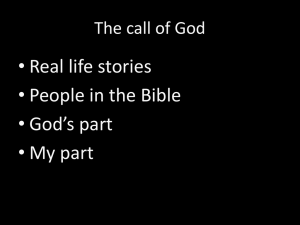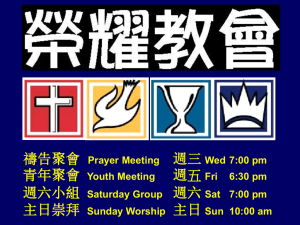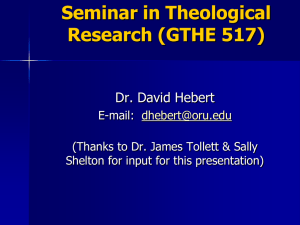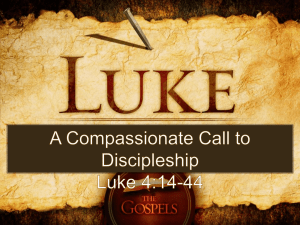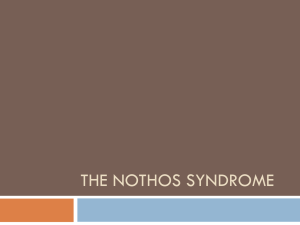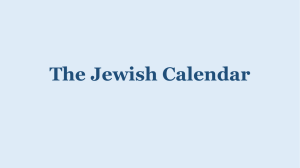The Seven Assemblies of Revelation
advertisement
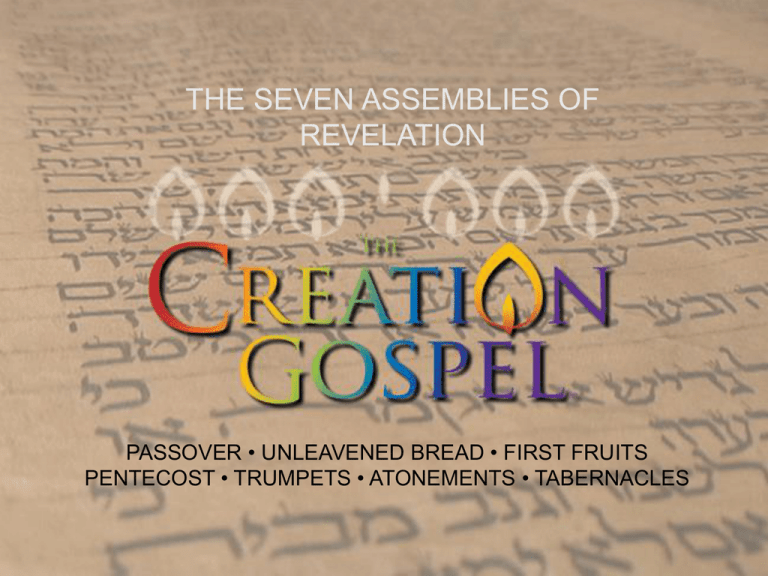
THE SEVEN ASSEMBLIES OF REVELATION PASSOVER • UNLEAVENED BREAD • FIRST FRUITS PENTECOST • TRUMPETS • ATONEMENTS • TABERNACLES “…repent or I will remove your lampstand…” • In Scripture, a clear difference is made between “your feasts” and “My feasts.” The heart determines if our moedim are His or ours. If the moedim are fueled by the lamp of the Holy Spirit, what lamp fuels “our” feasts? Job 21:17 "How often is the lamp of the wicked put out, Or does their calamity fall on them? • Putting out the lamp of a man is his death. Proverbs 21:4 Haughty eyes and a proud heart, The lamp of the wicked, is sin. • The wicked have another menorah at work in their bodies, the sinful work and influence of evil spirits. Reference this passage in Proverbs 6:16-19 There are six things which the LORD hates, Yes, seven which are an abomination to Him: Haughty eyes, a lying tongue, And hands that shed innocent blood, A heart that devises wicked plans, Feet that run rapidly to evil, A false witness who utters lies, And one who spreads strife among brothers. Yeshua is the King and Lamp of the Holy Moedim! Rev. 21:23 And the city has no need of the sun or of the moon to shine on it, for the glory of God has illumined it, and its lamp is the Lamb. • Yeshua, the one in the midst of the menorah in Revelation, is coming to extinguish the false light of The Wicked Lamp on Earth. The message to the seven assemblies of Revelation is the final wake-up call to mankind to recognize HIM as the King of the moedim and to turn from syncretized worship AND celebrations of the moedim ruled by The Wicked Lamp. Adonai will first send The Wrath of the Lamb to clean His own House with calamity! To: Ephesus Passover – Adat Pesach From: The One who holds the seven stars in His right hand, the One who walks among the seven golden lampstands Creative Clean Works of the Spirit of Wisdom: I know your deeds and your toil and perseverance, and that you cannot endure evil men, and you put to the test those who call themselves apostles, and they are not, and you found them to be false; and you have perseverance and have endured for My name's sake, and have not grown weary. Yet this you do have, that you hate the deeds of the Nicolaitans, which I also hate. Unclean Works of Death: But I have this against you, that you have left your first love. Commands: Remember therefore from where you have fallen, and repent and do the deeds you did at first; or else I am coming to you, and will remove your lampstand out of its place-- unless you repent. Exhortation: He who has an ear, let him hear what the Spirit says to the assemblies. To him who overcomes, I will grant to eat of the tree of life, which is in the Paradise of Study Text Exodus 1:1-14 What was the condition of the Hebrews before Passover? How does this relate to the "toil and perseverance" of the Ephesians? TOIL AND PERSEVERANCE IN EGYPT Study Text Exodus 8:119 When did Pharaoh's magicians fail the test? How does this text relate to the Ephesians' ability to "test" apostles? TESTING THE APOSTLES AND MAGICIANS Study Text Exodus 10:812:28 What would Pharaoh not permit Israel to do? What did Adonai NOT permit the Death Angel to do? What DID Adonai permit the Death Angel to do? Ephesus means “permitted.” This corresponds to the “season of our freedom,” or Passover, the season of freedom from slavery, not only from a cruel Egyptian slavemaster, but from sin. An interesting fact about Ephesus is that from c.100 BC to c.AD 100 Ephesus was the world capital of the slave trade. Study Text Exodus 11:7 If Egypt represents darkness, and Israel light, how does this recall the First Day of Creation? How did Egypt feel about the Hebrews when Joseph still lived? Should Egypt repent and return to those "first works" of love? How does Egypt represent unrepentance? Hebrews had light in Goshen while Egyptians had thick darkness because of their unrepentance: “…repent and do the deeds you did at first; or else I am coming to you, and will remove your lampstand out of its place.” The Spirit of Wisdom is also associated with light: Ecclesiastes 2:13 And I saw that wisdom excels folly as light excels darkness Study text Jeremiah 2:2-3 What kind of love was experienced after the Passover? With which Spring and Fall Feasts is Passover connected by "first of his harvest"? Jeremiah 2:2-3 "Go and proclaim in the ears of Jerusalem, saying, 'Thus says the LORD, "I remember concerning you the devotion of your youth, The love of your betrothals, Your following after Me in the wilderness, Through a land not sown. "Israel was holy to the LORD, The first of His harvest. All who ate of it became guilty; Evil came upon them," declares the LORD.'" Leaving First Love The Passover was the first festival (other than the Sabbath) to be replaced by the Roman Church with a pagan festival in name, customs, and date. This can be verified in a variety of Church history books. Can this be defined as leaving one’s “first love”? “Constantine’s Creed: …a Jew ‘Must confess and denounce verbally, the whole of Hebrew people, forthwith declare that with a whole heart and sincere faith he desires to be received among the Christians. Then he must renounce openly in the church…replying in these words: I renounce all customs, rites, legalisms, unleavened breads and sacrifices of the lambs of the Hebrews, all of the other feasts of the Hebrews, sacrifices, prayers, aspersions, purifications, sanctifications, propitiations, and fasts and new moons, and Sabbaths, and superstitions, and hymns and chants, and observances of the synagogues, and the food and drink of the Hebrews; (Stefano Assemani, Acta Sanctorium Martyrum Orientalium at Occidentalium, Vol. 1, Rome 1748, page 105). The Nicolaitans ISBE Bible Dictionary “The problem underlying the Nicolaitan controversy, though so little direct mention is made of it in Scripture, was in reality most important, and concerned the whole relation of Christianity to paganism and its usages. The Nicolaitans disobeyed the command issued to the Gentile churches, by the apostolic council held at Jerusalem in 49-50 AD, that they should refrain from the eating of "things sacrificed to idols" (Acts 15:29). Such a restriction, though seemingly hard, in that it prevented the Christian communities from joining in public festivals, and so brought upon them suspicion and dislike, was yet necessary to prevent a return to a pagan laxity of morals. To: Smyrna Unleavened Bread-Adat Chag HaMatzot From: The First and Last who was dead and has come to life Creative Clean Works of the Spirit of Understanding: I know your tribulation and your poverty (but you are rich), and the blasphemy by those who say they are Jews and are not, but are a synagogue of Satan. Unclean Works: None mentioned Commands: Do not fear what you are about to suffer. Behold, the devil is about to cast some of you into prison, that you may be tested, and you will have tribulation ten days. Be faithful until death, and I will give you the crown of life. Exhortation: He who has an ear, let him hear what the Spirit says to the churches. He who overcomes shall not be hurt by the second death. SMYRNA Matzah and Maror The myrrh from which the city Smyrna takes its name is an integral ingredient of burial spices. Think of the related word, “maror,” which are the bitter herbs eaten with Unleavened Bread at Passover to remind Israel of their suffering in Egypt. As the family consumes the Passover meal each year, the Creation Gospel of the Lamb is re-told and lived anew personally in each family. From the bitterness of Smyrna is both the remembrance of suffering and the perfume of Yeshua’s vicarious death and burial sacrifice . Study Text Mark 15:22-24 Study text John 12:1-8 The Matzah • What was offered to Yeshua as an anesthetic for his suffering and tribulation? How does this and unleavened bread relate to Egypt (Mitzraim)? • Why did he refuse? • Why is Yeshua the anesthetic to our suffering? • What what was the purpose of the perfume poured on Yeshua? • How was Yeshua buried as one meek and poor, yet rich? • • • • Examine the picture of Matzah below. Who else was “poor man’s bread”: Striped Bruised Pierced SMYRNA = MYRRH, A BURIAL SPICE AND ANESTHETIC Affliction, poverty, and multiplication of seed • Exodus 1:11-12 So they appointed taskmasters over them to afflict them with hard labor. And they built for Pharaoh storage cities, Pithom and Raamses. But the more they afflicted them, the more they multiplied and the more they spread out, so that they were in dread of the sons of Israel. •The Hebrew word for afflict and humble is anah. The more humbling affliction, the more Israel’s seed multiplied. This connects Unleavened Bread to Firstfruits. Yeshua’s death brought forth much seed. The dry tree of crucifixion judgment became a fruitful green tree, a Tree of Life. Dry, unleavened bread brings forth the Bread of Life. UNLEAVENED BREAD Death of the Carnal Flesh Deuteronomy 8:2-3 You shall remember all the way which the LORD your God has led you in the wilderness these forty years, that He might humble you, testing you, to know what was in your heart, whether you would keep His commandments or not. He humbled you and let you be hungry, and fed you with manna which you did not know, nor did your fathers know, that He might make you understand that man does not live by bread alone, but man lives by everything that proceeds out of the mouth of the LORD. If the assembly of Smyrna sees the wisdom and understanding of testing during the days of Unleavened Bread, then what is that assembly to understand is the purpose of this test? Prepare for testing from the 10th of Nisan until the conclusion of Unleavened Bread. Live humbly and simply during these chiastic Terrible Days. Pergamum Firstfruits of the Barley – Adat Yom HaBikkurim From: The One who has the sharp two-edged sword To: Creative Works of the Spirit of Counsel: I know where you dwell, where Satan's throne is; and you hold fast My name, and did not deny My faith, even in the days of Antipas (like the father), My witness, My faithful one, who was killed among you, where Satan dwells. Unclean Works of Death: You have there some who hold the teaching of Balaam, who kept teaching Balak to put a stumbling block before the sons of Israel, to eat things sacrificed to idols, and to commit acts of immorality. You have some who hold the teaching of the Nicolaitans. Commands: Repent or else I am coming to you quickly, and I will make war against them with the sword of My mouth. Exhortation: He who has an ear, let him hear what the Spirit says to the churches. To him who overcomes, to him I will give some of the hidden manna, and I will give him a white stone, and a new name written on the stone which no one knows but he who receives it.' PERGAMUM Height, Elevation • The scorching of barley symbolizes fires of Death and Hell, the first death. The waving, or elevation of the sheaves represents spirit of resurrection and resurrection of Mashiach. Chiastically, the elevation or “rising” of barley is also the rising of the saints on Yom Teruah. Yom Teruah is the “stem-mate” of Firstfruits of the Barley. Both deal with a type of elevation and raising of the righteous from the ground. • The Pergamum assembly is promised hidden manna for overcoming. Pergamum is connected to Sardis (Firstfruits to Yom Teruah) chiastically. They are stem-mates on the menorah. Yom Teruah is known as the “hidden day” in Judaism. Overcoming through obedience at this stage of the moedim carries a promise of hiding “in the clouds” during the covered and hidden days of the Fall Feasts. To: Thyatira Pentecost – Adat Shavuot From: The Son of God, who has eyes like a flame of fire, and His feet are like burnished bronze Creative Clean Works of the Spirit of Adonai: Your deeds, and your love and faith and service and perseverance, and that your deeds of late are greater than at first. Unclean Works: You tolerate the woman Jezebel, who calls herself a prophetess, and she teaches and leads My bond-servants astray, so that they commit acts of immorality and eat things sacrificed to idols. 'And I gave her time to repent; and she does not want to repent of her immorality. 'Behold, I will cast her upon a bed of sickness, and those who commit adultery with her into great tribulation, unless they repent of her deeds. 'And I will kill her children with pestilence; and all the churches will know that I am He who searches the minds and hearts; and I will give to each one of you according to your deeds. Commands: 'But I say to you, the rest who are in Thyatira, who do not hold this teaching, who have not known the deep things of Satan, as they call them-- I place no other burden on you. 'Nevertheless what you have, hold fast until I come. Exhortation: He who overcomes, and he who keeps My deeds until the end, to him I will give authority over the nations; and he shall rule them with a rod of iron, as the vessels of the potter are broken to pieces, as I also have received authority from My Father; and I will give him the morning star. 'He who has an ear, let him hear what the Spirit says to the churches.' Seat of the Sun-god ISBE Bible Dictionary: Thyatira was a wealthy town in the northern part of Lydia. It was a small, insignificant town. It stood on none of the Greek trade routes, but upon the lesser road between Pergamos and Sardis, and derived its wealth from the Lycus Valley in which it rapidly became a commercial center, but never a metropolis. The name “Thyatira” means “the Castle of Thya.” Before the time of Nicator the place was regarded as a holy city, for there stood the temple of the ancient Lydian sun-god, Tyrimmos; about it games were held in his honor. Upon early coins of Thyatira this Asiatic god is represented as a horseman, bearing a double-headed battle-ax. Another temple at Thyatira was dedicated to Sambethe, and at this shrine was a prophetess, by some supposed to represent the Jezebel of Rev 2:20, who uttered the sayings which this deity would impart to the worshippers. Thyatira was specially noted for the trade guilds which were probably more completely organized there than in any other ancient city. Every artisan belonged to the guild. Powerful among them was the guild of coppersmiths; another was the guild of the dyers, who it is believed, made use of the madder-root instead of shell fish for making purple dyestuffs. Hitchcock’s Bible Names Dictionary: Thyatira, a perfume, sacrifice of labor. SHAVUOT Tongues of Fire The Son of God has eyes “like flames of fire.” In Acts 2 “tongues of fire” were manifest at Shavuot. An eye in Hebrew is an ayin, which also means a well of water, and is used as a symbol of the Spirit of Adonai. The Son of God has eyes (wells, spirits) of fire as well as water. This represents the heavens, which are called the shamayim. This alludes to the mayim (water) with the Hebrew letter shin as a prefix. The shin represents fire, esh. Heaven can symbolically be viewed as “fire-water.” Yeshua’s eyes, or seven spirits, are filled with heavenly fire. Book of Ruth Teaches Shavuot Labor and Sacrifice Shavuot is associated with the hard work of the mid-summer and the full barley harvest of Ruth and Boaz. The Book of Ruth is read in the synagogues at Shavuot because the book covers the period between the Firstfruits of the Barley Harvest, the Third Festival, and Shavuot, the Firstfruits of the Wheat Harvest, the Fourth Festival. Ruth’s hard work for mature barley relate to Yeshua’s recognition of the Thyatira’s “deeds.” Shavuot requires deeds greater than at first, a maturity of wheat when the wheat in Israel ripens between early-summer Shavuot and the Fall Feasts. Ruth bore Boaz a son Oved, servant. Ruth was the symbol of the righteous Gentiles gathered in from the nations. Boaz’ blessing on Ruth is that her deeds be recompensed of Adonai. Ruth’s faithfulness to glean only in Boaz’ field until the fullness of the barley and wheat harvest and her reward is contrasted to the adultery of the Thyatirans. Jewish Boaz’ willingness to welcome, comfort, and marry a righteous Moabitess relates to the Fourth Day of Creation, the Spirit of Adonai, and Acts 2:1-8. Shavuot at Sinai and Thyatira The Thyatiran acts of immorality and idolatry recall the Israelites’ false feast to Adonai after Shavuot while Moshe was on the mountain. If he had known what the Israelites would do, these could well have been Moshe’s words as he prepared to climb the mountain: 'But I say to you, the rest who are in Thyatira, who do not hold this teaching, who have not known the deep things of Satan, as they call them-- I place no other burden on you. 'Nevertheless what you have, hold fast until I come. 'And he who overcomes, and he who keeps My deeds until the end, to him I will give authority over the nations; and he shall rule them with a rod of iron, as the vessels of the potter are broken to pieces. Moses passed on the same authority of eternal priesthood and judgment to the Levites for defending the sanctity of the Name against apostate Israelites and the mixed multitude from the nations when Moses returned from Sinai and demanded that the Israelites take sides. The Levites responded to Moses, killing their own brethren for wicked deeds. To: Sardis Day of Trumpets – Yom Teruah From: He who has the seven Spirits of God, and the seven stars Creative Clean Works of the Spirit of Power: You have a few people in Sardis who have not soiled their garments; and they will walk with Me in white; for they are worthy. He who overcomes shall thus be clothed in white garments; and I will not erase his name from the book of life, and I will confess his name before My Father, and before His angels. Unclean Works: I have not found your deeds completed in the sight of My God. Commands: Wake up, and strengthen the things that remain, which were about to die. Remember therefore what you have received and heard; and keep it, and repent. If therefore you will not wake up, I will come like a thief, and you will not know at what hour I will come upon you. Exhortation: He who has an ear, let him hear what the Spirit says to the churches SARDIS Red Ones Sardis means Red Ones. It is a red alarm that the Days of Awe (10 days between Yom Teruah and Yom Kippurim) will either gather righteous men with the Yom Teruah trumpet tekia blast or scatter wicked man to judgment of Yom Kippur with the trumpet teruah. Red is the color of Adonai’s wrath and the color of sin that will be judged in the Book of Remembrance. It is also the root of the Hebrew name of mankind, adam. The names of men are inscribed with deeds that will either be permanently remembered or blotted out from the Presence of Heaven. Yom Teruah judges the deeds of mature believers, The Bride, and those who have refused to come to perfection. SARDIS Coverings of Red or White? From Yom Teruah to Yom Kippur, the standard blessing in Judaism is “may your name be inscribed in the Book of Life.” Because of the uncertainty of the sighting of the New Moon on Yom Teruah, even in Israel the festival is celebrated for two days as The Hidden Day. In Judaism, Yom Teruah is known as Rosh HaShanah or Yom HaKeseh. Yom HaKeseh is “The Hidden Day,” from a Hebrew root meaning to conceal, cover, or hide. The central theme of the Fall Feasts is coverings: clouds, blood, incense, white robes, oil, tabernacles. For those who refuse this season of repentance, the Lamb will come as one hidden, like a thief. Preparation for Yom Kippur It is traditional to wear white at Yom Kippur. Yom Teruah’s theme in Judaism is The Kingdom of Adonai, and it is a call to repent and prepare for truly white spiritual garments. Some who suffer will overcome and receive white garments ten days before Yom Kippur. In synagogues, the traditional ark curtains and bimah covers are replaced with white and left in place for the duration of the High Holy Days. Those who give the Torah a final resting place in their bodies will receive the white garments also at Yom Teruah. They are the “red ones” covered with the blood of The Lamb. Wake Up and Strengthen! Yom Teruah is the Day of the Awakening Blast. The message carried by the “birds”of the Fifth Day to mankind is to wake up, for judgment is coming. It corresponds to the Spirit of Power, or Gvurah, which is strength. The Sardinians are commanded to move in this spirit of Yom Teruah. To: Philadelphia Day of Atonement – Adat Yom HaKippurim From: He who is holy, who is true, who has the key of David, who opens and no one will shut, and who shuts and no one opens Creative Clean Works of the Spirit of Knowledge: I know your deeds. Behold, I have put before you an open door which no one can shut, because you have a little power, and have kept My word, and have not denied My name. 'Behold, I will cause those of the synagogue of Satan, who say that they are Jews, and are not, but lie-- behold, I will make them to come and bow down at your feet, and to know that I have loved you. Because you have kept the word of My perseverance, I also will keep you from the hour of testing, that hour which is about to come upon the whole world, to test those who dwell upon the earth. Unclean Works: None mentioned Commands: I am coming quickly; hold fast what you have, in order that no one take your crown. Exhortation: He who overcomes, I will make him a pillar in the temple of My God, and he will not go out from it anymore; and I will write upon him the name of My God, and the name of the city of My God, the new Jerusalem, which comes down out of heaven from My God, and My new name. 'He who has an ear, let him hear what the Spirit says to the churches.' A Pillar in the Temple… • A “pillar” dmu in the Hebrew sense is something that continues standing. The root of moed, or festival, in Hebrew, is the word for eternity “ad” du. The same letters make moed and amud. • The memo to Philadelphia describes the experience of the overcomer as one who will no more go out of the Temple for eternity, like a moed: “Psalm 75:2-3 When I select an appointed time (moed), It is I who judge with equity. The earth and all who dwell in it melt; It is I who have firmly set its pillars. Selah. The Psalm makes it clear that one pillar of the moedim is judgment. On Yom Kippur, which corresponds to Philadelphia, the judgment is made. The blood of “Holiness to Adonai” is accepted, and the scapegoat is driven to a desolate place. PHILADELPHIA Brotherly Love is the Spirit of Knowledge I know your deeds. Behold, I have put before you an open door which no one can shut, because you have a little power, and have kept My word, and have not denied My name. 'Behold, I will cause those of the synagogue of Satan, who say that they are Jews, and are not, but lie-behold, I will make them to come and bow down at your feet, and to know that I have loved you. Ruach Daat, The Spirit of Knowledge, is intimate relationship, whether of Adam and Eve who were created as one on the 6th Day of Yom Kippur, or brothers in unity, yachad. The 6th Day is the vav “w” , or connectedness. Because Philadelphia has “a little power” the Spirit of Gvurah from Yom Teruah, and have been faithful to the Word and the Name (deeds and authority over the Earth), the door to Heaven and the Holy of Holies is open to receive and protect them during the hour of testing. The faithful will be marked by Adonai’s “love” so all will know He and His Bride are one in the Ruach Daat. A Name Written On Yom Kippur, the High Priest could enter the Holy of Holies. With the Spirit of Knowledge, which is love, our High Priest Messiah Yeshua opens the way for his Bride to dwell in the Temple. The Bride no more has to depart from the Presence and receives a new name that is written. Consider people or sacrifices of Scripture who received distinguishing marks for a lack of moed loving knowledge that separated them from the Presence. Kayin had a mark, and he couldn’t come back to the assembly because he hated his brother; he did not live in Philadelphia, or in the Spirit of Knowledge. On Yom Kippur, the scapegoat’s name was “L’Azazel,” and he was separated with the sins of Israel. To: Laodicea Tabernacles – Adat Shabbat/Sukkot From: The Amen, the faithful and true Witness, the Beginning of the creation of God Creative Clean Works of the Spirit of Reverence: None mentioned Unclean Works: I know your deeds, that you are neither cold nor hot; I would that you were cold or hot. So because you are lukewarm, and neither hot nor cold, I will spit you out of My mouth. Commands: Because you say, "I am rich, and have become wealthy, and have need of nothing," and you do not know that you are wretched and miserable and poor and blind and naked, I advise you to buy from Me gold refined by fire, that you may become rich, and white garments, that you may clothe yourself, and that the shame of your nakedness may not be revealed; and eye salve to anoint your eyes, that you may see. Those whom I love, I reprove and discipline; be zealous therefore, and repent. Exhortation: Behold, I stand at the door and knock; if anyone hears My voice and opens the door, I will come in to him, and will dine with him, and he with Me. He who overcomes, I will grant to him to sit down with Me on My throne, as I also …sit down with me on my throne • The symbol of the throne is strong in relation to Sukkot. • The root of sukkah is also related to the word (1492)(sokek), which is a covered structure. The cherubim's wings were to cover (sakak) the mercy seat, or throne, in the tabernacle (Exo 37:9) and the temple (1Chr 28:18). • Found in 2 Kings 16:18 is the passage where it describes "the covered way for the sabbath" which was removed by wicked King Ahaz. There is another possible translation of this verse, which is that shabbat is to be read as "throne,”: Achaz removed the "the covered place of the throne" after he removed the precious silver and gold vessels of the Temple, gave them to the king of Assyria, and set another altar, a pagan altar beside the altar of Adonai. • Regardless of how the verse is translated, whether as the covered way for the Sabbath or the covered place of the throne, anyone who removes the covering of Sukkot is in a confederacy with the King of Assyria, a type of anti-christ. An anti-christ is one who is against the Messiah, the Living Word. By removing Israel’s covering of Sabbath, the anti-Messiah attempts to subvert the throne and Kingdom of Messiah, our rest in Messiah Yeshua. This is the danger at Sukkot, or Laodicea. The Sabbath “clothes” us for our Messiah Yeshua. The covered throne of the Sabbath… • At the Council of Laodicea in 363, the Church of Rome declared • Canon 29: "Christians must not judaize by resting on the Sabbath, but must work on that day, rather honoring the Lord's Day [Sunday]; and, if they can, resting then as Christians. But if any shall be found to be judaizers, let them be anathema from Christ. • Canons 37-39: It is not lawful to receive portions sent from the feasts of Jews or heretics, nor to feast together with them. • Light hath no communion with darkness. Therefore no Christian should celebrate a feast with heretics or Jews, neither should he receive anything connected with these feasts such as unleavened bread and the like. The Beginning of the Creation of God • The Church of Laodicea was clearly warned by our Yeshua the Messiah, the Faithful and True Witness, the Beginning of the Creation of God, to be careful. The Beginning, Passover and Unleavened Bread, chiastically, is the End, Sukkot on the menorah. As the Seventh Assembly, Laodicea should have been on their guard for deceptions concerning the Sabbath, Passover, and Sukkot, the culmination of all seven festivals. Instead, they inherited lies separating them from brothers, a wicked spirit. They lost their sense of time, the eternal moedim, and the Holy Spirit that moves through them. • Non-Jewish Christians believed themselves superior to their Jewish brothers and their Creator’s appointed Holy Sabbath. The faithful who tried to keep the seventh day Sabbath were persecuted and killed by the Church. Are we today feeling superior to our Jewish brothers in respect to the moedim? Draw Near With a New Name On the other hand, here are examples of the name allowing the wearer or marked person/sacrifice to draw near: On Yom Kippur, the sacrifice goat’s lot/name was “L’Adonai;” his blood was brought near the Holy of Holies. The name written on the high priest’s turban was “Kadosh l’Adonai; the high priest drew near the Holy of Holies on Yom Kippur. The mark and name of the Bride on Yom Kippur is “Holiness to Adonai”, and instead of separating, the mark and name draws near the Presence I will come in and dine… • The Feast of Sukkot requires that the firstfruits ingathering of the produce of the Land (from winevats, threshing floors, fruits and oil of goodly trees, clean livestock) be eaten before YHVH, with Levites, family, stranger, widow, orphan, and alien. • It is a dining experience such as Yeshua describes in his exhortation, and no one in Israel who desires to celebrate Sukkot is denied a share. • The Lamb is knocking at the door of any person or nation who desires to open the door to moed of Sabbath and Sukkot. THE SEALS WILL OPEN… TO ORDER STANDING WITH ISRAEL, CREATION GOSPEL WORKBOOK, OR FULL PANEL CREATION GOSPEL TEACHING BROCHURES, GO TO: WWW.ISRAELNET.TV
